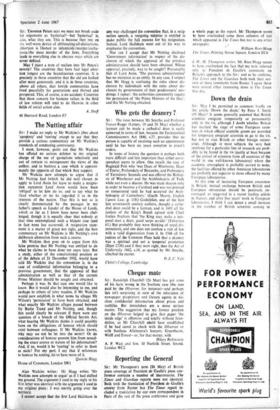Who gets the deanery ?
Sir: The issue between Mr Smythe and Professor Trevor-Roper (Letters, 19 and 26 May) whether a layman can be made a cathedral dean is easily answered in terms of law, because the Ecclesiastical Commissioners Act 1840, s.27, provides that no person is capable of receiving such an appointment until he has been six years complete in priest's orders.
In terms of history the question is perhaps both more difficult and less important than either corre- spondent seems to allow. One recalls the case of Reginald Pole who 'was Dean of Wimborne, Dean of Exeter, Prebendary of Biscombe, and Prebendary of Yatminster Secunda and was offered the Bishop- ric of Winchester and the Archbishopric of York while not even a deacon. He was made deacon only in order to become a Cardinal and was not priested or consecrated until he had accepted the Arch- bishopric of Canterbury.' (Garth Moore, English Canon Law, p. 119.) Godolphin, one of the best late seventeenth century authors, thought a cathe- dral dean could be a layman, and in 1605 all the justices of the King's Bench agreed with Chief Justice Popham that 'the King may make a tem- poral man a dean, quod saepe aceidit.' (Yelverton 61.) But probably they were thinking of royal dis- pensations, and one does not confuse a rule of law with a valid dispensation from it. In 1568 all the justices of the Common Pleas held that a deanery was a spiritual and not a temporal promotion (Dyer 273b) and if they were right, then the Act of Uniformity 1662, s.14, as quoted by Mr Smythe, clinched the matter.


































 Previous page
Previous page